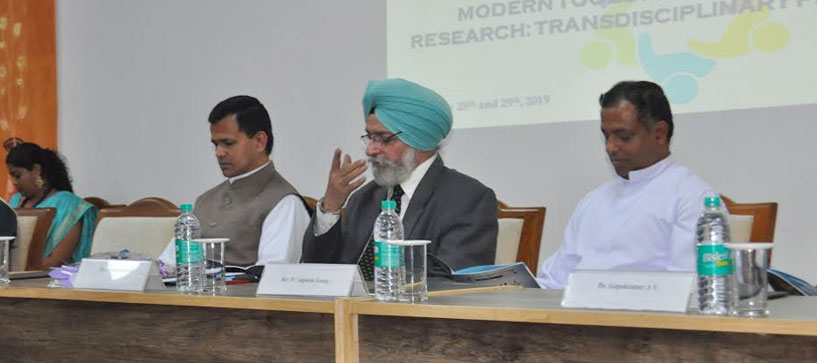
Seminar / Conference
National Seminar on Third Wave Psychotherapy: Innovation in Mental Health Intervention
Date:26 August 2025
The Department of Psychology at Kristu Jayanti (Deemed to be University) organized a National Seminar on Third-Wave Psychotherapy: Innovations in Mental Health Interventions on August 26, 2025, at the SKE Auditorium in hybrid mode, drawing over 275 participants from 69 universities across 21 states. The seminar was inaugurated by Rev. Dr. Augustine George, Vice Chancellor In Charge, Kristu Jayanti (Deemed to be University). He emphasized the institution’s commitment to promoting mental health awareness and academic excellence during the inaugural function. The keynote address was delivered by the Chief Guest, Dr. Naveen Grover, Assistant Professor, Department of Clinical Psychology, from Institute of Human Behaviour and Allied Sciences (IHBAS), New Delhi, who emphasized on psychotherapy's evolution, mindfulness, acceptance, and culturally sensitive approaches to issues like student addiction. The session explored psychotherapy's rewards, challenges, empathy, self-care, supervision, emotional regulation, declining clinical oversight, and resilience. Plenary Session I by Dr. Devvarta Kumar, Professor, Department of Clinical Psychology, NIMHANS, covered Metacognitive Therapy (MCT) as a transdiagnostic tool, discussing metacognitions, Cognitive Attentional Syndrome, and techniques like detached mindfulness for anxiety, phobias, and depression. Plenary Session II by Dr. Nithya Hariya Mohan, Assistant Professor, Chengalpattu Medical College and Hospital, Tamil Nadu, detailed Eye Movement Desensitization and Reprocessing (EMDR) as an integrative trauma therapy, covering the AIP model, bilateral stimulation, eight-phase protocol, and tools like SUD and VoC scales, with a demonstration.
A panel discussion was moderated by Ms. Soumya Simon, Assistant Professor, Department of Psychology, Kristu Jayanti (Deemed to be University). The Panelists included Mr. Anil V. Iyer, Counsellor & Psychotherapist, Bengaluru, Dr. Sritha Sandon, Assistant Professor, Christ (Deemed to be University), Bengaluru, and Dr. Elizabeth Daniel, Associate Professor, Montfort College, Bengaluru. Mr. Anil V. Iyer highlighted the use of DBT, MBCT, CFT, and ACT in such contexts, stressing how these approaches encourage cognitive flexibility, small step-by-step changes, and mindfulness practices to improve well-being and work performance. Dr. Sritha Sandon spoke on the three waves of psychotherapy, highlighting third-wave's process-oriented, experiential methods like ACT and DBT for acceptance and psychological flexibility. Dr. Elizabeth Daniel discussed about age-specific challenges, ethical boundaries, and evidence-based adaptations for children and adolescents.
The event concluded with a workshop by Fr. Dr. Rajeev J Michael, Assistant Professor, Rajagiri College of Social Sciences on Mindfulness-Based Cognitive Therapy (MBCT), involving experiential exercises in body scans and breath awareness to foster resilience, emotional regulation, stress reduction, and applications for conditions like ADHD, promoting compassion and quality of life.
The national seminar advanced innovative and compassionate mental health practices through interactive Q&A sessions and mementos for speakers, offering balanced insights into clinical psychology's opportunities and demands.
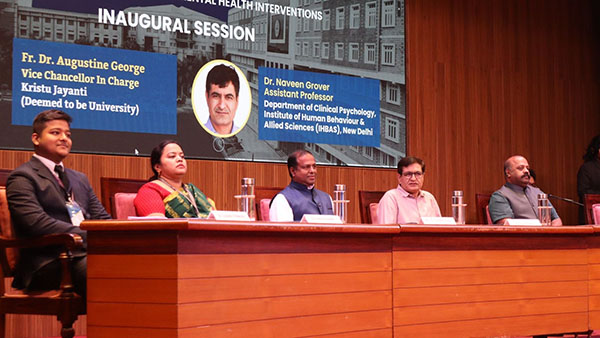
International Conference INSIGHT 2025: Mental Health at Work
Date: 27 & 28 March 2025 November 2024
The Department of Psychology at Kristu Jayanti College, Autonomous, in collaboration with the Clinical Psychology Society of India (CPSI), successfully hosted the International Conference INSIGHT 2025: Mental Health at Work on March 27–28, 2025. The conference provided a dynamic platform for over 300 delegates from India and across the globe, including Morocco, Spain, Malaysia, Qatar, and Indonesia, to engage in discussions on workplace mental well-being. Attended by psychologists, industry leaders, and academicians, the event facilitated meaningful dialogues on fostering healthier work environments.
The conference commenced with an inspiring inaugural ceremony graced by eminent figures such as Dr. K. Ramachandran, Former Director of the Defence Institute of Psychological Research (DIPR), and Dr. Jamuna Rajeswaran, Professor and Head, Department of Clinical Psychology, NIMHANS, and Hon. President of CPSI. Both speakers highlighted the growing recognition of psychological support in workplace settings. Rev. Fr. Dr. Augustine George, Principal of Kristu Jayanti College, delivered the presidential address, emphasizing the crucial role of mental health in enhancing organizational success.
The first day featured thought-provoking keynote addresses and plenary sessions. Dr. Annette Kreuz Smolinski, Director of ‘Phase 2’ Family Therapy Centre, Spain, delivered a keynote session on Systemic Approaches to Workplace Mental Health, likening workplace dynamics to family systems. Dr. Upinder Dhar, Vice Chancellor of Shri Vaishnav Vidyapeeth Vishwavidyalaya, underscored the importance of psychological assessments in recruitment and employee well-being.
Plenary sessions included Entrepreneurship and Mental Resilience by Dr. Keerthi Pai, Mental Health Advisor at Apollo Shine Foundation, and Technology and Mental Health at Work by Dr. Smriti Joshi, Chief of Clinical Services at Wysa. The day concluded with a vibrant cultural performance by the psychology students, celebrating the role of creativity in mental well-being.
The second day delved deeper into specialized themes, beginning with a keynote session on Strategic Change Management by Dr. R. Karthikeyan, Founder of Gemba Management Consulting. Dr. Rajani Parthasarathy, Deputy Director (Mental Health), Government of Karnataka, elaborated on Mental Health Initiatives by the Government, discussing policy interventions and community outreach programs.
A session on Mindfulness and Resilience Training at Workplaces, led by Dr. Kalpana Srivastava, Professor at Amity Institute of Behavioural Health & Allied Sciences, provided insights into cultivating resilience among employees. The panel discussion on Inclusivity in the Workplace featured an esteemed panel of experts, including Mr. Venkatachalam Subramanian, Senior Manager at Accenture; Dr. K V Kishore Kumar, Executive Director of BALM; and moderator Mr. Sumit Dutta, Counseling Psychologist.
INSIGHT 2025 showcased 129 scientific paper presentations and 59 poster presentations covering diverse themes related to workplace mental health. These research contributions reflected the evolving landscape of workplace mental health strategies and interventions.
The conference successfully reinforced the urgency of prioritizing mental health in professional spaces. By fostering insightful discussions, research collaborations, and policy recommendations, INSIGHT 2025 paved the way for a more resilient, inclusive, and healthier workforce. The event left a lasting impact on participants, emphasizing the crucial role of mental health in shaping the future of work.
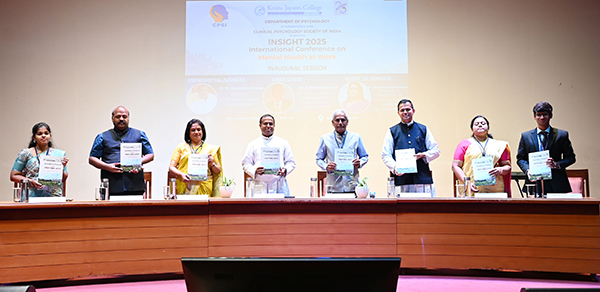
National Seminar on Psychological Perspective of Viksit Bharat 2047
Date: 07 November 2024
Inaugural Session
The Department of Psychology at Kristu Jayanti College, Autonomous, organized a National Seminar on Psychological Perspectives of Viksit Bharat 2047 on November 7th, 2024. The event commenced with an inaugural ceremony at 9:15 am, attended by distinguished guests, including Professor Girishwar Misra, Former Vice Chancellor, Mahatma Gandhi Antarashtriya Hindi Vishwavidyalaya and former Head of the Department of Psychology at the University of Delhi, and Father Dr. Augustine George, Principal, Kristu Jayanti College, Autonomous.
Father Dr. Augustine George presented Professor Misra with a sapling as a symbol of respect and goodwill. In his presidential address, Father Augustine reflected on India’s progress towards becoming a global economic powerhouse, emphasizing India’s competitiveness and its alignment with the "Skilled India" and "Digital India" visions. Professor Girishwar Misra delivered an insightful keynote address, offering his perspectives on Viksit Bharat 2047 and the role of psychology in fostering wellness, resilience, and growth as India moves towards its goals by the centenary of independence.
Session 1: The Role of Social Psychology in Viksit Bharat 2047 The first session on the Role of Social Psychology in Viksit Bharat 2047 was delivered by Dr. Girishwar Misra, who highlighted the need for a united national vision for a developed India. He emphasized the role of individuals in nurturing key pillars such as youth, the poor, women, and farmers. A significant part of his talk focused on the psychological aspects of national pride and identity, encouraging citizens to contribute to shaping the country’s future.
Dr. Misra also elaborated on the importance of psychological resilience and self-efficacy, suggesting that these qualities can drive societal transformation. He connected these concepts to historical examples of India’s adaptability, relating them to Sternberg’s theory of adaptive intelligence. He concluded with a vision of India as a knowledge-based economy by 2047, characterized by a skilled workforce, social cohesion, and sustainable practices, underscoring the role of psychology in achieving these goals.
Session 2: The Role of Psychologists in Human Resource Development This session, led by Ms. Kasturi Cotha, an HR Thought Leader and Honorary Secretary of the NHRD Bangalore Chapter, focused on the intersection of psychology and industry. Ms. Cotha shared her personal journey in psychology and outlined how psychological insights are reshaping industrial psychology. She emphasized the evolving corporate culture, which is shifting from a profit-centric model to one that prioritizes employee well-being and customer-centric service.
Ms. Cotha highlighted frameworks such as the “5B model” and the “5 Ps” in HR management, which emphasize the human-centered approach to workforce planning and organizational development. She also touched on the importance of employee engagement and well-being, especially in the context of adapting to changes brought about by artificial intelligence and other technological advancements.
Session 3: Resilience as a Key to National and Personal Growth In this session, Prof. S. Karunanidhi explored resilience as a foundational quality for both individuals and nations. He discussed how fostering qualities like empathy, forgiveness, and humility can contribute to resilience, particularly in India’s diverse cultural landscape. He emphasized that resilience not only helps individuals thrive in challenging environments but also strengthens societal harmony.
Prof. Karunanidhi introduced Dr. Ginsburg’s 7 Cs Model of Resilience—Competence, Confidence, Connection, Character, Contribution, Coping, and Control—explaining how each component builds resilience. He also discussed the role of “happy hormones” (Dopamine, Oxytocin, Serotonin, and Endorphins) in promoting mental well-being and resilience, reinforcing the idea that resilience supports a balanced and fulfilled life.
Session 4: The Importance of Reskilling and Upskilling Dr. Jayakumar, Associate Professor in the Department of Psychology at Periyar University, led this session on Reskilling and Upskilling. He discussed the growing need for continuous skill development in today’s rapidly evolving professional landscape. Dr. Jayakumar highlighted the historical progression of skill evolution and emphasized the importance of adaptability in ensuring long-term success.
He also explained how upskilling and reskilling are essential to addressing knowledge gaps created by technological advancements and societal changes. Dr. Jayakumar encouraged students to actively engage in skill development through various academic and extracurricular activities, stressing the importance of emotional skills such as self-awareness and empathy in personal and professional growth.
Session 5: The Role of Psychology in Enhancing National Defence The final session, delivered by Dr Suresh A, Scientist F at the Defence Institute of Psychological Research, focused on the role of psychology in national defence. Dr. Suresh highlighted the importance of psychological preparedness and mental resilience in military personnel, emphasizing the psychological strategies employed to maintain morale and cope with stress in high-pressure environments.
Throughout the seminar, participants gained valuable insights into how psychology contributes to national development, human resource management, resilience-building, and defence preparedness, aligning with India’s vision for 2047. Each session offered a unique perspective on the role of psychology in shaping a strong and progressive nation.
Session 6: The Role of a Counselling Psychologist in Empowering the Nation The fifth plenary session, presented by Rev. Fr. Emmanuel P. J., Director of Kristu Jayanti College of Law, Bengaluru, offered a profound exploration of the pivotal role counselling psychologists play in shaping India's future. As the nation moves toward 2047, Fr. Emmanuel underscored the critical need for mental health professionals, especially counselling psychologists, to empower individuals and communities amidst the rapid social, technological, and cultural changes. One of his key points focused on the importance of mental health advocacy. He emphasized that psychologists must proactively raise mental health awareness across various sectors of society, from schools to workplaces. Fr. Emmanuel highlighted the need to break the stigma surrounding mental illness and promote mental health literacy, ensuring individuals can recognize symptoms and seek help without fear of judgment. By addressing these pressing needs, counselling psychologists can contribute significantly to the mental well-being and empowerment of the nation.

Seminar on Entrepreneurial landscaping in Psychology
Date: 25 October 2024
The Department of Psychology organized a Seminar on Entrepreneurial landscaping in Psychology on 25th October 2024. The resource person for the event was Ms. Ruth Josephine, an alumni from the 2019-2021 batch and the founder of Joespot Mental Wellness Services. The Workshop was attended by 108 postgraduate students from the Department of Psychology.
Ms. Josephine opened the seminar by discussing the fundamental concept of entrepreneurship within psychology. She highlighted growing opportunities for psychologists to make impactful contributions to corporate wellness, school mental health programs, and community mental health outreach.
Furthermore, she discussed how resilience, adaptability, networking skills, and financial literacy are essential for navigating the challenges of launching and sustaining a business. She encouraged students to build these skills proactively, as they are crucial for managing both the practical and emotional demands of entrepreneurship.
Ms. Josephine’s dynamic and authentic delivery created an open and enthusiastic environment, encouraging students to ask questions and reflect on their career paths. Her willingness to share her professional journey, including both successes and setbacks, added a layer of honesty and transparency that was highly appreciated by attendees. The seminar left students feeling inspired and well-informed, equipped with valuable tools and insights to consider entrepreneurship as a viable and fulfilling career option.

Seminar on Psychology as an Applied Science
Date: 12 August 2024
The Department of Psychology at Kristu Jayanti College, Autonomous, organized an expert seminar on "Psychology as an Applied Science" on 12th August 2024. The session was specially curated for 97 students from I B.Sc. Psychology (A & B) to enhance their understanding of psychology's real-world applications.
The seminar featured Ms. Rasika Godbole, a consultant psychologist from Mind Calm Centre, who shared her insights on essential research methods, including observation, the experimental method, questionnaires, and case studies. Ms. Godbole effectively broadened the students' knowledge by integrating clinical examples, famous psychological experiments, and practical illustrations, helping them connect theoretical learning to practical scenarios. Visual aids, such as cross-sectional charts, were employed to enhance the students' understanding of key concepts.
The session also involved engaging discussions and thought exercises, allowing students to apply theoretical concepts to real-life situations. Ms. Godbole presented a case study from her practice, demonstrating how psychological theories are applied in diagnosing and treating mental health conditions.
The seminar concluded with a significant outcome, successfully broadening students' conceptual knowledge and linking theoretical learning with practical applications. It inspired future career exploration in applied psychology and enhanced critical thinking among the participants.
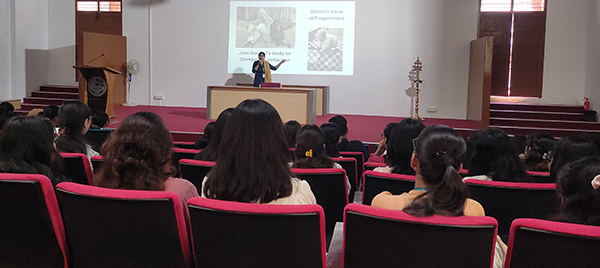
INSIGHT 2024 A National Conference on Cognition and Emotion - Through Developmental Perspective
Date: 15 February 2024
The Department of Psychology, Kristu Jayanti College Autonomous, Bengaluru in collaboration with InSPA (Indian Society of Psychology and Applied Sciences), organised “INSIGHT 2K24,” a National Conference that dwelled over the corresponding theme of “Cognition and Emotion – Thought Developmental Perspective” on 15th of February 2024. The Event was Inaugurated at the venue SKE Auditorium in the PG Block of the college at 9:30 am and, it was presided over by the Chief Guest, Prof. Panch Ramalingam (President InSPA), with the Guest of Honour Dr. Sreenivas M (Professor and Chairman, Department of Psychology, Bangalore University) and Fr. Emmanuel.P.J, Director, Kristu Jayanti College of Law Delivered the presidential Address
The National Conference Insight 2024 saw the release of InSPA’s Kannada version book “:Bharatiya Sanniveshadhalli Shala Manovizhnana” by the distinguished guests who presided over the session.
The Psychology Department of Kristu Jayanti announced and released the magazine “Pravaha,” which shows the department’s hard work and The pre-conference on February 14th set the stage for two subsequent days filled with scientific sessions and guest lectures on February 15th and 16th. There were 13 scientific sessions in-which the students from all the college came together to present their research. The judges gave constructive opinions and criticisms to ensure further changes or tweaks in the research which allowed the students to perform much better and learn much more than they knew. Three keynote sessions,Two plenary sessions , a cultural program was conducted where in the people from multiple colleges perceive and enjoy the performance Fostering greater camaraderie among all students
Keynote Session 1was delivered by Dr. Sreenivas.M Professor and Chairman, Department of Psychology, Bangalore University under the theme “Social Cognition”
Keynote Session 2 was by Prof. Panch Ramalingam, President InSPA, Director UGC Malaviya Mission Teacher Training Center, Pondicherry University, who spoke under the theme “School Psychology in Cognitive Perspective”.
Keynote Session 3 was by Dr. Suja Koshy Former Associate Professor, Head, Department of Human Development, Mumbai, who spoke on the topic “Unveiling the Mixed EI Model through the Developmental Lens.”
Plenary Session 1 was conducted by Dr. K. Jayasankara Reddy (Associate Dean and Professor of Neuropsychology, Christ University), Dr. B. Rangaiah (HOD, Dept. of Psychology, Pondicherry University) and Dr. Shah Alam (Professor Dept. of Psychology Aligarh Muslim University) In the SKE Auditorium.
Plenary Session 2 was conducted by Dr T Santhanam (Director, SDS Academy of Behavioural Sciences, Chennai) and Dr. Vijaykumar (Consultant freelance, Trainer and Educator, Chennai).
The national conference, which consisted of scientific sessions and guest lectures, was highly commendable, featuring diverse presentations. The event facilitated valuable networking and enriched student’s’ understanding of the theme "Cognition and emotion- Thought Development perspective". The content of the presentations was insightful and promoted a greater understanding of the complex relationships that existed between thought and emotion. The presentations gave the participants a thorough understanding of the thought development viewpoint.
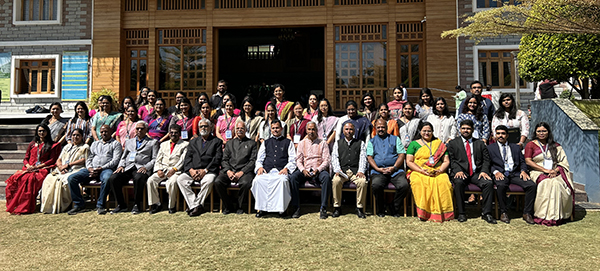
National Conference INSIGHT 2024 Pre-Conference Workshop
Date: 15 February 2024
The Department of Psychology organized a pre-conference workshop on February 14th, 2024 at the M1 Auditorium, from 9:00 AM to 1:00 PM. There were two resource persons for the day: Dr. V.S.R Vijayakumar, a consultant and freelance trainer, who delivered a presentation on memory and creativity; and Dr. T. Santhanam, Director of the SDS Academy of Behavioural Sciences, Chennai, who delivered a presentation on training in study skills. About 164 high school students from St. Mary’s High School and Don Bosco High School benefitted from the sessions.
In an engaging session aimed at enhancing memory skills, Dr. V.S.R. Vijaykumar captivated the young students of St. Mary's School and Don Bosco School with his presentation. He started with the basics of memory, including encoding, storage, and retrieval processes, and introduced a range of effective memory techniques such as rote learning, association, mnemonics, and concept mapping. The highlight of his session was the demonstration of the Roman Room Technique, where he impressively recalled a list of 25 random words provided by the students. This practical application showcased the potential and effectiveness of the memory strategies discussed, making a significant impact on the students' understanding of memory.
Dr. T. Santhanam took the stage to focus on study skills, delivering a presentation filled with energy and humour that immediately grabbed the students' attention. He emphasized the importance of a structured and consistent study routine, advocating for the creation of a weekly timetable to avoid cramming before exams and to reduce stress. Stressing the need for adequate rest, especially before exams, he introduced the students to ashtanga yoga, demonstrating its benefits for enhancing concentration. Additionally, he touched upon the advantages of hypnotherapy in improving focus, rounding off his session with a video demonstrating its impact. Through these sessions, Dr. Santhanam and Dr. Vijaykumar not only imparted essential academic skills but also inspired the students to pursue personal growth and better study habits.
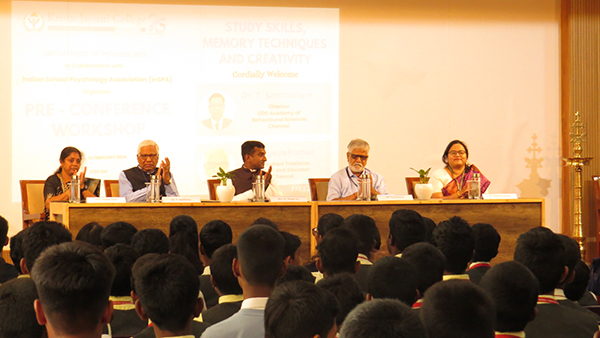
National level Conference – INSIGHT 2023 on Intelligence in Animals, Humans, and Machines
Date: 18 and 19 April 2023
The conference witnessed participants from over 12 different institutes across India. The Chief Guest was Dr. Shailesh Nayak, Director, NIAS and the Guest of honour was Prof. Mewa Singh, Distinguished Professor (for Life), and SERB Distinguished Fellow, Institution of Excellence, Vijnana Bhavan, University of Mysore. Dr. Molly Joy, Head of the Dept., welcomed the guests, delegates, and all the students as she marked the beginning of the conference. The prelude to the conference was given by the Chef Convener, Dr. V. V. Binoy, Associate Professor, National Institute of Advanced Studies (NIAS). The presidential address was delivered by Fr. Dr. Augustine George, Principal, of Kristu Jayanti College. The inaugural speech was presented by the Chief Guest who shared his perspective on human evolution. He further discoursed the concept of Intelligence and his take on artificial intelligence.
The speech was followed by the release of the Department's Annual Magazine ‘Pravaha’ by Rev. Fr. Emmanual P J, Director, Kristu Jayanti College of Law & Faculty, Department of Psychology. The inaugural session came to an end with felicitation of the guest of honour.
In the afternoon session, Prof Mewa Singh presented an inaugural lecture on ‘Urbanization and the Evolution of Novel Forging Skills’ in monkeys where he shared several of his works with animals carried out in the Nicobar Islands. This was followed by a presentation by Prof L. M. Patnaik on Artificial Intelligence. The scientific session began at 3 pm on the first day where we had 6 paper presentations. We marked the end of the first day with a cultural event.
The chief guest on the Day 2 of the conference was Dr. Manas K Mandal, IIT Kharagpur, Formerly, Director-General - of Life Sciences in DRDO and Director of the Defense Institute of Psychological Research. The session started with a lecture by the chief guest on Human Intelligence: Behavioral, Neuroscientific, and computational approaches. He highlighted the approaches to understanding the construct of Intelligence and its relationship with human cognition. This was followed by a panel discussion on Artificial and Human Intelligence. The panelists were Prof. Ayshwarya B and Prof. Margaret Mary, Dept. of Computer Science, KJC, and Prof. Vigraanth Bapu K G, Dept. of Psychology, KJC. The session was moderated by Prof. Sevuga Pandian A, Head of the Dept, Computer Science, KJC.
A scientific session was scheduled in the afternoon. 17 papers were presented by participants from different institutes. Day 2 of the conference was called to an end with the distribution of certificates. Insight 2023 was a grand success with participants expressing elation and immense gratitude for having got an opportunity to be part of something so significant.
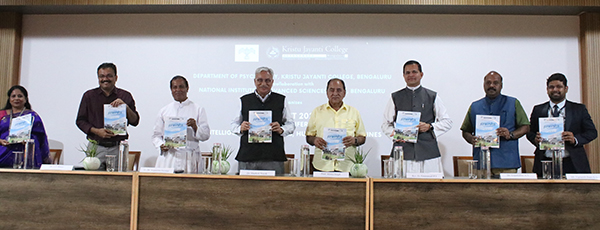
Seminar On Innovation, Incubation, And Business Acceleration
Date: 28 January 2023
The speaker, Ms. Alia S of second-year PG student started the session by giving a welcome address and brief introduction of resource persons. Later, the session was started by Dr. A. Muruganantham who gave the orientation to the students about the importance of the Kristu Jayanti Incubation Centre and IIC cell and its various activities and programs for the academic year. During the session, the students were oriented on how to create an ecosystem for start-ups and imparted knowledge of various aspects of entrepreneurship.
He provided information regarding the basic infrastructure necessary to start a business and a support system for mentoring, guidance, and management training. Also, made them aware of small business details by the funding agencies and the wider business Environment. In the next session, the speaker also explained about of Four Cell Working under KJIC and Building and Streamlining Innovation and Start-up Ecosystem in Higher Educational Institutions, Network of Institution’s Innovation Council (IIC), IIC Institute Types, and KJIC program Category Details oriented. Finally, the KJC IIC Annual Program Details were informed, Role of IIC Council Members, IIC council Student Members Benefits & Rewards, and Achievements were shown and encouraged to the students. Later, In the Question-and-Answer Forum, the speaker went through the questions of participants and clarified all the doubts in an effective manner by giving more examples and making the session more interesting. This was also very inspiring and motivating for all PG 1st year students. The speaker also clarified the doubts of many students regarding the start-up. Finally, the session ended again with a formal vote of thanks.
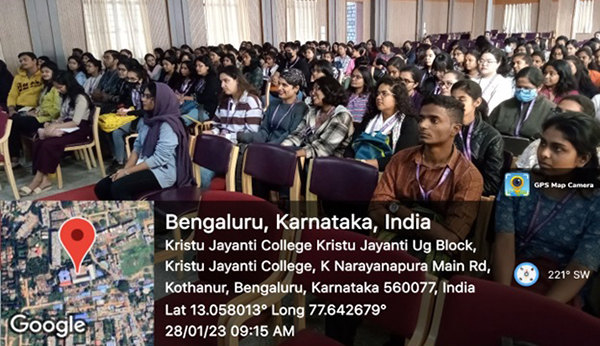
Malnourishment and its impact on mental health among girl children
Department of Psychology organized National Level Seminar on Malnourishment and its impact on mental health among girl children on 27/8/2022 online mode from 10am -12pm. Resource person for the session was Prof. L.N. Suman, Consultant, Adult Psychiatry Unit, Consultant, Trauma Recovery Clinic, NCWB, Chairperson, Internal Complaints Committee, NIMHANS, on Malnourishment and its impact on mental health among girl children
The inaugural address was given by Dr. Molly Joy in which important statistics associated with malnourishment was discussed. Objective of the national level seminar was to create awareness among mental health professionals and budding professionals in the grey area of malnourishment covered in the information shared by Professor Suman. The session was thought provoking and she delivered the seminar with great expertise on the subject matter. She talked about malnourishment as a global challenge in detail. She explained the impact of malnourishment on the mental health of girls. She talked about various factors, causes and symptoms. Influence of culture and patriarchy as one of the factors leading to malnourishment among girl children was detailed. She gave an in depth note on the mental health of girl children who suffer from malnourishment. She talked about what we can do as a society to improve this condition, what role the government and legal bodies can play in eradicating malnourishment.
364 participants attended the event and shared their valuable feedback on the relevance of the topic.
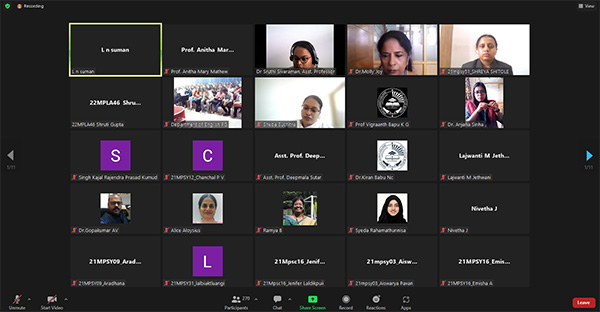
Virtual International Conference ‘INSIGHT 2022’
Theme: Technological Revolution- Opportunities and Challenges for Family and Student Community
Conference Day 1
The inaugural session began at 9:30 am. The prelude to the conference was given by Rev. Fr. Emmanuel P J, Director, Kristu Jayanti College of Law, and Faculty, Department of Psychology. Fr. Emmanuel gave an overview of the humble beginnings of the college, the achievements and journey of excellence in the past 23 years; the milestones and pursuit of excellence of the Department of Psychology, the present courses offered, and student research skills and ended with a brief outline of the two day Conference schedule, highlighting the key speakers, and topics to be discussed. Rev. Fr. Lijo P Thomas, Financial Administrator, in his presidential address, spoke about the relevance and need of the hour to discuss the opportunities and challenges regarding the impact of technology on family and student community. Fr. Lijo also addressed the vital role that technology plays, with the rise of new media and information and communications technologies (ICT), and how these dynamic changes have societal impacts.
The Chief Guest for the day Dr Doug Oman, Director of Spirituality and Public Health Traineeship, emphasised the contributions of religious engagement and spiritual practices to health, community and well-being. He stated in his inaugural address that research has shown the beneficial associations between spiritual practices and the health and well-being of individuals. Dr Oman mentioned how though technology has assisted individuals and communities in multiple areas like intercultural contact across the globe, it has also led to threats to what is currently termed as “attentional health”; the ability to concentrate and more. Meditative practices, prayer practices and other spiritual practices help individuals in dealing with these threats to attentional health as they improve or strengthen attention.
After the inaugural address, Dr. Susan K Walker, Associate Professor, Family Social Sciences, University of Minnesota, Twin Cities in a pre-recorded video gave an introductory message to the participants. Dr Walker underlined her primary motivation for the students to gain critical thinking skills as technological users and that while the students enjoy the efficiency, creativity and connectivity of the technology, they should also be aware of how they might be sacrificing their privacy, security and safety in the process. She also emphasised the need to be aware of the challenges faced by people like the elderly, people who have limited incomes or those who live in countries that are less economically developed, to access technology and what these disparities mean to family life. Through the knowledge gained through these platforms, the family professionals who directly work with the families can provide emotional and informational resources that aid mental and physical health, parenting, quality of life and their use of technology.
The inaugural session was followed by the keynote session by Fr. Dr. Rajeev J. Michael, Assistant Professor, Department of Psychology, Rajagiri College of Social Sciences, Kerala. The session was on the topic, Technology Addiction: Impact on Family and Student Community. Fr. Dr. Rajeev focused on digital addiction during the pandemic and whether it was an addiction or a coping mechanism used by people to survive the situation; excessive use of the internet would lead to psychological problems like depression and anxiety and these problems may have been already present which was masked by addiction; addiction is more prevalent in early adolescence and that males usually depend on gaming while females are on social networking sites. The process of addiction includes searching for self-worth, poor ability to delay gratification, digital fatigue loop, addiction increases stress and intermittent reinforcement. The signs of addiction, according to Fr. Rajeev, lie in the role of family connectedness, and parenting styles. The prevention and intervention include CBT strategies, integrated approach and reSTART programs.
The Plenary session on the topic, Impact of technology on Child and Adolescent Mental Health was given by Dr. Archana Sharma, Founding Director Carpedium EdPsych Consultancy LLP. Dr. Archana tried to identify the balance between virtual reality and life by focusing on the effect of technologies. Almost 98% of students have a mobile phone and among that 94.9% are having a smartphone and this is one of the common exposure that is happening. Psychological, emotional and physical effects that ensue and its consequences were pointed out. Physiological aspects included excessive screen time and brain and Isolation, mood swings, social incompatibility, and aggression included the cause of psychological and emotional distress.
Day 1 continued with the scientific sessions, and over 20 participants presented their research papers.
Conference Day 2
Plenary Session II was addressed by Dr. Sebastian Perumbilly on the topic ‘Impact of Technology on Family and Work-Life Balance of Faculty in Indian Higher Education.’ Dr. Perumbilly spoke about e-technology and telework, the boundary between work and family is increasingly blurred for faculty members. Dr Perumbilly also introduced the terms ‘work-extensification’ and ‘work-intensification’ during the session which he says are key reasons for the changing work culture resulting in the boundary invasion.
This session was followed by a panel discussion. The moderator for the session Dr. Sanjram Premjit Khanganba, Associate Professor, Human Systems Interaction (Human Factors), IIT Indore started the session by welcoming everyone and outlining the program agenda. The first speaker was Mr. Kartheek Nagasuri, Co-Founder, Little Triangle Private Ltd. who outlined the evolution of various mediums of learning from learning how to write on the sand to projectors, computers, tablets, phones, etc. to the utilization of 3D models to teach students. He talked about the importance of being mindful when learning online. The next speaker, Mr. Anand Desai, Education Programme Manager, IT for change, highlighted the role of technology in enabling a lot of content and different contexts to be integrated into teaching-learning spaces. He also talked about the access and affordability of technology. Prof. Sevuga Pandian, Head, Department of Computer Science(UG) talked about the “new normal” and the importance being given to online degree programs and the National Education Policy 2020. He shed light on how the integration of technology in education is helping the sector grow in India. However, this growth is not without challenges, according to him, for example, simple things like net coverage and speed, one device being managed by many people etc. Ms. Jini Lobo, Director and Dean Academics, Life school, Bengaluru called attention to the advantages to homeschooling as opposed to the traditional ways of providing education to individuals. She highlighted how technology is an absolute boon for the homeschooling fraternity, be it familiarizing, inculcating or evaluating various curriculums and helping students be equally or more competent than students who are in the traditional systems of education. The session was summarized and additional remarks were given by the moderator.
The last plenary session commenced at 2:10 pm. Mr. Mathew Joseph spoke on the topic “Integration of Artificial Intelligence- Challenges and Opportunities for Family and Student Community”. Sir explained how AI works and the positive and negative impacts of AI on the family and student community. He also emphasised on how AI will change human experiences in the future. The session was concluded with a Q and A. The valedictory session commenced at 6:00 pm. The chief guest for the session was Dr. Philip Laird, Vice President of Innovation, Global and Academic Partnerships, Trinity Western University, Canada. In his valedictory address, Dr. Philip brought forward the statistics on the impact of technology on the mental health of individuals across the globe, various examples of people committing suicide because of online bullying and online gambling were stated and humans’ slowly leaving their emotional connectivity and moving to cyber nomads and the need for optimum use of technology was emphasised on. The presidential address was given by Rev. Fr. Emmanuel P J, Director of Kristu Jayanti College of Law, and Faculty, Department of Psychology. Then the best paper was awarded to Ms. Reva Mary George, Research Scholar, Christ (Deemed to be University), Bangalore for the paper titled “Virtual Classrooms: Employing Flow Theory to Increase Student Engagement during Online Classes.” The international conference was indeed a wonderful time of deliberation for all the delegates.
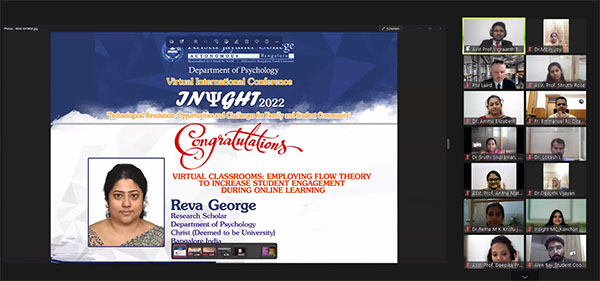
Online seminar on Orientation to Supervised Concurrent Field Work
Department of Psychology organized an online seminar on Orientation to Supervised Concurrent Field Work on 25th August 2021 from 2 PM to 4 PM for III M.Sc. Counselling Psychology Students. The resource persons for the programme were Dr. Sruthi Sivaraman, Assistant Professor, Department of Psychology, Kristu Jayanti College and Ms. Navya M Patel, Assistant Professor, Department of Psychology, Kristu Jayanti College.
The orientation began with a brief introduction regarding fieldwork and roles and responsibility by Dr. Sruthi Sivaraman. A major emphasis was laid by the resource person on choosing the fieldwork place wisely with regard to our personal areas of interest as well as building our competence by means of exploring the various settings of counselling to find the perfect fit, as this would benefit the students in the long run. Dr. Sruthi Sivaraman also spoke about the importance of putting in the theoretical knowledge that we gained into practice, learning via modelling, observation and experiential learning in order to enhance professional growth. Later, the general objectives of fieldwork were discussed and the criteria for choosing an appropriate organization/counselling center were explained in detail.
Ms. Navya M Patel then took over the session and focused on the curriculum expectation where a detailed explanation about the course objective and the course out come and expectation from students was given. The resource person stated that the purpose of carrying out field work is two-fold. Firstly, to bridge the gap between the theory and practice that exists. And secondly, to enhance student’s skills and acquire practical exposure in a guided setting and impart knowledge. An explanation regarding evaluation of the student by the supervisor via the supervisor evaluation form was given and the evaluation criteria for the students was also broken down and explained. The student’s role at the fieldwork was discussed and they were asked to keep a site supervision log form wherein the date, time in, time out, direct and indirect hours as well as the signature of the supervisor would be recorded. It was also mentioned that a brief report of the work done is required to be submitted to the teachers in charge on a daily or weekly basis. Later, the format for the field work report was projected and explained and the content that needs to be included under various sections was also oriented. The students were then asked to prepare a CV as some organizations prefer to submit a CV and a covering letter mentioning their strengths as a counselling psychologist intern for approaching any organization. Various challenges that a student might face during the fieldwork were addressed by the resource person. The importance of learning the local language was also stressed to eradicate the language barrier while providing counselling to the clients during field work and for professional development. 55 students of III M.Sc. Counselling Psychology were benefitted from this seminar where students were able to gain an in-depth understanding regarding choosing the right place for field work. Students also learnt that it is important to try and use the theoretical knowledge that they have gained the post-graduation period to grow personally as well as professionally. In the end students provided a positive feedback about the seminar.
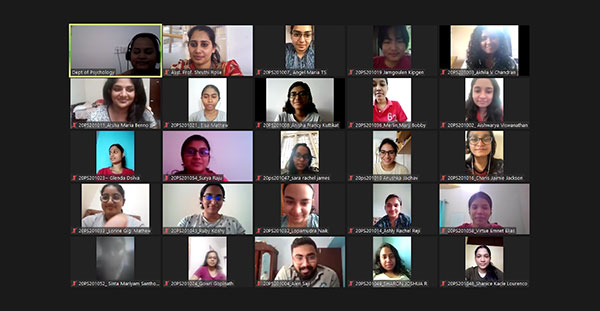
National Online Conference on Careers in Psychology
The National Online Conference on Careers in Psychology was organized by Kristu Jayanti College, Bengaluru in collaboration with Mind weavers, Calicut, Adamas University, Kolkata, Psycho waves and ASFAR on 12th and 13th June 2021.
The program began with the prelude to the conference by Dr. Molly Joy, Professor and Head, Department of Psychology, Kristu Jayanti College, Bengaluru. The first plenary session was taken by Dr. Jamuna Rajeswaran, Professor and Head Clinical Neuropsychology & Cognitive Neuroscience, NIMHANS, Bangalore. In her session, Dr. Jamuna spoke on “Career as Neuropsychologist” and highlighted the different career opportunities in the field. She also focused on the basics of Brain- functions and structure, Neuropsychology, Assessments and its fundamentals. After clearly narrating about “How to become a Neuropsychologist?” she answered various queries raised by the participants.
The resource person for the second plenary session of the day was Dr. K.N Jayakumar, Assistant Professor, Dept of Psychology, Periyar University, Salem. Dr. K.N Jayakumar took the session on ‘Organizational Psychology: Trends and Advancements’. In his session, he spoke about the fundamentals of organization and organizational psychology. He put forward different areas where an organizational psychologist would perfectly fit and stressed the changes brought in by the present world scenario.
In plenary session three, the resource person Mr. Jalil M.S spoke about opportunities and career in psychology in India and abroad. He also highlighted various courses, internships and careers in India and abroad
The afternoon session was conducted by Dr. Dhanesh Gopalan, Clinical Psychologist, NMC Royal Hospital, Abu Dhabi. In his session, Dr. Dhanesh Gopalan elaborated on the scope of psychologist in middle eastern countries. He stressed the qualification and licensing required for opportunities in middle eastern countries.
In plenary session five Mr. Raheemudheen P.K., Clinical Psychologist, Govt Mental health care centre, Thrissur talked about the trends and opportunities in Rehabilitation Psychology. He highlighted the importance of the field by stating national and international statistics by different organizations. He emphasised that it’s a multidimensional issue that requires a multidisciplinary team and highlighted the role of a psychologist in the field of disability management and rehabilitation.
The plenary sessions were followed by three scientific sessions. The sessions were chaired by Dr. Jihili Das, Associate Professor, Adamas University, Kolkata, Dr. Amjad Ali, Assistant Professor, Adamas University, Kolkata, Dr. Sweta Sah, Assistant Professor, Adamas University, Kolkata. A total of twenty-one research papers were presented by the candidates from different parts of the country.
The second day of the national conference began with the session by Dr. Santhosh K.R. Assistant Professor of Psychology, CHRIST (Deemed to be University), Bangalore. In his session, Dr. Santhosh K.R. spoke on DRDO and DIPO recruitment and how psychology students can invest in the field of research. The second session for the day began with the session by Mr. Sibin Raj K., Psychology Scientist, DRDO. The resource person enlightened the participants with the key aspects in the field of Military psychology, its origin and development and showed the path to achieve their goal in the field of military psychology.
In the 3rd session for the day by Mr. Muhasin. V., Consultant & Coach in Sports Psychology, Calicut, Mr. Muhasin. V. focused on the Career Prospects as a Sports Psychologist. He mainly gave information about the institutions where sport psychology aspirants can join to pursue and accomplish their dream.
The afternoon session began with three scientific sessions. The sessions were chaired by Dr. Kiran Babu, Assistant Professors, Kristu Jayanti College, Bengaluru, Dr. Deepthi Vijayan, Assistant Professors, Kristu Jayanti College, Bengaluru, Dr. Lokesh L., Assistant Professors, Kristu Jayanti College, Bengaluru, and Ms. Shruthi Rose, Assistant Professor, Kristu Jayanti College, Bengaluru. A total of fifteen research papers were presented by the candidates from different parts of the country.
A Q & A session on school counselling was held from 2:30 PM – 3:30 PM followed by a session by Dr. Sumona Dutta Head, Dept. of Psychology, Adamas University, Kolkata, on Careers In Psychometry: New Directions And Emerging Issues. She discussed the new trends in tool construction and validation.
The last session of the conference was by Mr. Mebin Wilson, Assistant Professor, Forensic Psychology, JAIN (Deemed-to-be University). Mr. Mebin Wilson spoke on Forensic Psychology: Present Scenario in India and Abroad. He enlightened the participants on how forensic psychologist work, the role of Forensic psychologist, misunderstandings that common people have about criminal profiling etc.
The conference ended with the closing note, feedback session and the vote of thanks by Dr. Molly Joy, Professor & Head, Department of Psychology, Kristu Jayanti College.
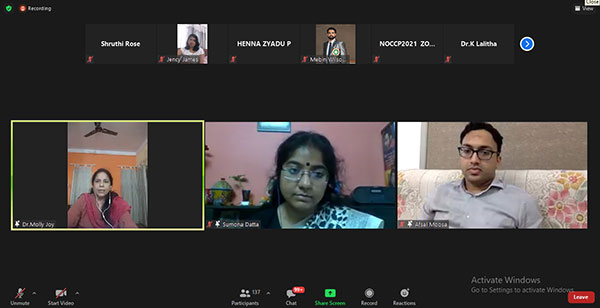
7th National Conference Insight 2021
The 7th National Conference Insight 2021 was organized by the Department of Psychology, Kristu Jayanti College, Bangalore on 25th and 26th February 2021. The theme for the conference was “Upskilling and Reskilling in Applied Psychology”.
The Conference commenced with the inauguration, Prof. Vimala M welcomed the gathering and the prelude to the conference was given by Dr. Molly Joy, Head, Department of Psychology, Kristu Jayanti College. The presidential address was given by Rev. Dr. Augustine George, Principal, Kristu Jayanti College where he emphasized the need to reskill and upskill oneself in the fast-paced, dynamic, and competitive work environment. Dr. Rajalakshmi introduced the chief guest, Prof. Arti Bakshi, Head Department of Psychology, University of Jammu, in her inaugural address Prof. Arti Bakshi spoke about reskilling and upskilling in research, education, teaching and the workplace and also gave an insight into the role of digital arenas and teaching pedagogies that can enhance the learning experience of the learner. The inaugural session ended with the vote of thanks by Dr. Deepthi Vijayan.
Day 1 consisted of 4 keynote sessions, which started sequentially after the inaugural session.
The first session on the topic Skill Enhancement and Training was handled Dr. Prasanna Kumar, Head of Career Development Centre, PES Trust, Head of the Department, Management, PES Institute of Technology and Management, Shimoga, Karnataka.
Dr. Kumar focused on addressing the biggest challenge that the nation is currently facing, the ‘talent crisis’ and skill gap across all domains due to the lack of utilization of the youth’s potential in the right manner. Dr. Kumar emphasized that the right training and skill enhancement of an individual stands as a priority irrespective of their academic background. The second session was on the topic “Emerging Trends in Assessment” by Ms. Nithi Sharma, from Pearson India Pvt Ltd. She elaborated on Pearson’s goals and mission to promote learning, positive mental health and well-being within the diverse communities of South Asia.
The third session on “Upskilling and Organization Change” started after the lunch break. The speaker for the session Mr. Suresh Michael, Additional General Manager (HR), BEL Corporate Office, Bangalore. While giving the example of Swiggy and Ola, Mr. Suresh said that organizational change can be adaptive and interactive change as well. He also enlightened the students about the efficiency process of BEL. He stressed that organizational changes are linked to external changes and overall vision. Day 1 ended with the 4th keynote session by Dr. Mohammed Abeer, Senior Counsellor, IIT Kharagpur. He spoke about the need for Upskilling among Mental Health Professionals. Dr. Abeer began with an emphasis on how therapists or counsellor should be able to remove the obstacles faced by the clients, He also highlighted the scarcity of skilled mental health professionals and also the importance of upskilling the present working mental health professionals.
Day 2 of the conference consisted of 2 keynote sessions and 3 parallel scientific sessions.
Session 5, was handled by Ms. Tanuja Babre, Programme Co-coordinator i-call, Technology-Assisted Counselling and Ethics, Visiting Faculty, TISS, Mumbai. She spoke on the ‘challenges and ethics in online/tele-counselling’ In her session, she mainly focused on Understanding Technology-Assisted Counselling, Ethics and Ethical dilemmas in technology-assisted counselling, Confidentiality and Privacy, Boundary issues, and value framework.
The sixth session was handled by Dr. H Ganesh Bhatt (MES Education Institution) on the topic “Re- equipping in changing arenas of Education”. He explained how the goal for education in the 21st century was to establish a quality education system that provides a learning experience relevant to current and future needs for continued economic and social development. The afternoon session consisted of 3 parallel scientific sessions in which 34 participants presented their papers. Dr. Krishnan Bhatt, Dr. Lokesh, Dr. Rema, Prof. Soumya Simon, Dr. Deepthi Vijayan and Dr. Kiran Babu chaired the scientific session.
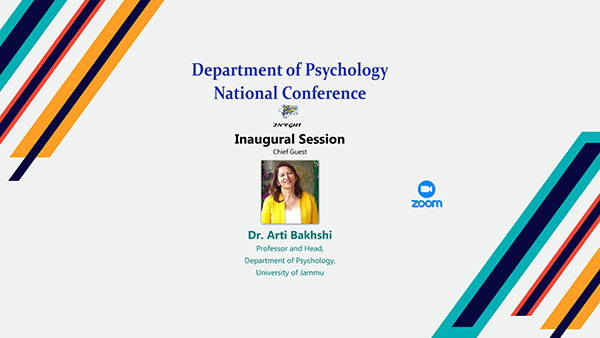
Webinar on the Mental Health Act and Norms for Private Practice
The Department of Psychology organized a webinar on ‘Mental Health Act and Norms for Private Practice’ on 21st November 2020 from 10:30 a.m. to 12:00 p.m. through Zoom platform. The resource person was Ms. Rama Subramanian, Advocate, High Court, Mumbai. Ms. Rama spoke about mental healthcare and services for persons with mental illness and to protect, promote and fulfill the rights of such persons during delivery of mental healthcare and services and for matters connected therewith or incidental thereto. Later due to some technical issues the session was continued by two internal faculty members- Dr. Krishnan Bhatt and Mr. Vigraanth Bapu K G. They continued the sessions by speaking on mental illness and capacity to make mental healthcare and treatment decisions, rights of persons with mental illness, and mental health establishments.
There were 206 participants for the webinar. The session was found to be effective and informative for all the postgraduate students as they would soon be venturing into their professional lives.
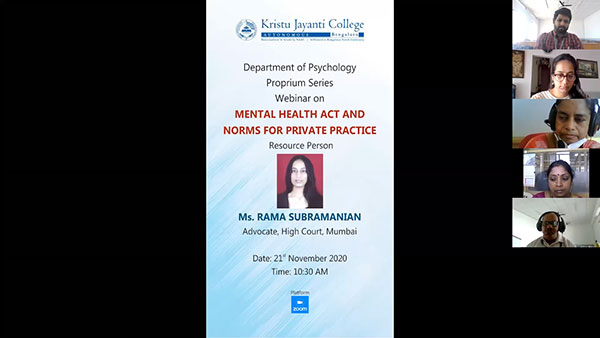
Proprium Series Webinar on Careers in Psychology
The Department of Psychology organised a Webinar on Careers in Psychology, as part of the proprium series on 24th October 2020 on Zoom Virtual platform from 11:00am to 12:30pm. Dr. Sudha Bhogle, former Professor of Psychology, Bangalore University and head of Educafe Student Solutions addressed the participants of the Webinar on Careers in Psychology.
A total of 623 participants attended the event, the audience were interactive and curious to know more about the careers in psychology, and what to pursue as their career after they complete their under graduation/ post-graduation. Dr. Sudha Bhogle explained about the scope of psychology and the career options the students can pursue using a detailed PowerPoint presentation. She also introduced the audience to the disciplines under psychology like industrial/ organizational psychology, cognitive psychology, sports psychology, clinical psychology, health psychology and many more.
Following the presentation the forum was open for questions from the audience and Dr.Bhogle answered the questions asked by the audience and gave them a deeper understanding of how and where they can pursue their career of interest.
The participants found the session to be informative and relevant.

International webinar on the impact of COVID-19 on the psychosocial wellbeing of the members of academia
An International webinar on the impact of COVID-19 on the psychosocial wellbeing of the members of academia was organized by the Department of Psychology on 30th, September, 2020 from 4:00 to 6:30 P.M. with a participation of 341 members from different parts of India, USA, Australia, Philippines, Bahrain, Oman, Muscat, and Nepal.
The resource persons for the Webinar were- Dr. Avinash De Sousa, Psychiatrist, Psychotherapist, and Founder Trustee- De Sousa Foundation, Dr. Sebastian Perumbilly, Associate Professor, Southern Connecticut State University and Dr. Guydeuk Yeon, Professor and Director of Research and Innovation Center at Christ Deemed to be University.
The webinar consisted of 2 sessions. The first session was on the Mental Health concerns among the members of academia in the post COVID scenario by Dr. Avinash De Sousa. In his session, he unveiled some major concerns faced by students and faculty members during the Lockdown. He highlighted the need to take necessary measures for self-care, improved interpersonal relationships, and prudent use of social media.
The second session was on the impact of COVID 19 on the personal wellbeing of the members of Faculty, Students and Non-Teaching Staff in Indian Academia: Research findings by Dr. Sebastian Perumbilly and Dr. Guydeuk Yeon who based on the research findings accentuated that the pandemic along with the negative impacts had more of a positive impact on the members of academia. The empirical findings suggested that self-care and personal functioning, professional growth, relationship with the immediate family, challenges experienced and addressed and spirituality and relationship with the transcendental improved during the time of the lockdown.
The sessions had a strong influence on the way the participants perceived the impact of the current pandemic and led to a paradigm shift whereby the focus was shifted from negative to the positive dimensions of the current scenario and the need to build on these positive dimensions to enhance the psychosocial wellbeing of the members of academia.
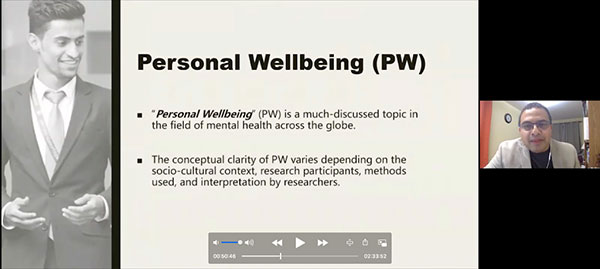
International Webinar on Aromatherapy
An International Webinar on Aromatherapy was organized by the Department of Psychology on 19th September 2020 from 10:30 am to 1:00 PM with a participation of 251 students and professionals. The resource person for the session was Mrs. Abbha SSinha, Psychotherapist (CAM) Integrative Wellbeing Alchemist, Energy, Forgiveness, Transformational, and Mind Coach. Founder of Wellbeing Valiy, Mind Mastry, and Yoganality.
The webinar began with the inaugural address by Rev. Dr. Augustine George, Principal, Kristu Jayanti College in which he emphasized the novel and indigenous therapeutic techniques including aromatherapy. During the session, the resource person gave a very detailed presentation about the physical, emotional, and mental benefits of aromatherapy. Mrs. Abbha started with a brief history of aromas and essential oils and it’s medicinal and healing properties. She explained the benefits, guidelines, and precautions while using aromatherapy. How it can be incorporated with yoga and chakras. Examples of aromas, essential oils, and natural products to uplift mood, calm the nerves, relax, and sleep well, were among many other benefits. She demonstrated how essential oils should be used and stored, combined, and inhaled. She also connected aromatherapy to the functions of the brain, olfactory system, digestive system, endocrine system, and circulatory system which was extremely insightful for all the participants. The Webinar ended with the valedictory address by Rev. Fr. Emmanuel P.J., Faculty Department of Psychology and Director, Kristu Jayanti College of Law in which he emphasized the importance and the efforts made to learn various indigenous techniques of healing and therapy.

Webinar on Intelligence Assessment
A Webinar on Intelligence assessment was organized by the Department of Psychology on 04th September 2020 from 10 AM to 1 PM through the Zoom Meeting Platform. The resource person for the webinar was Dr. Srinivasan Venkatesan, Head, and professor, Department of Clinical Psychology, All India Institute of Speech and Hearing (AIISH), Mysuru.
Dr. Venkatesan started the webinar by orienting the participants with the definition, history, classification, and purpose of Intelligence and Intelligence Assessment. He went on to discuss the steps involved in IQ assessment- starting from tool selection, administration, scoring, interpretation, results, and report writing. He gave a brief on various Indian tools for intelligence assessment, their technical advantages, and disadvantages. He also commented on the reasons why not many Indian assessments get represented in the Mental Measurements Yearbook. The resource person also threw light on the difficulties in conducting IQ assessment during the current COVID-19 pandemic situation and why adaptation to the online measurements are gaining more prominence. He concluded his session by citing the various cultural issues in Intelligence Assessment and the psychological reactions towards IQ testing of parents and the children. An elaborate explanation was given for all the queries asked by the participants. The session was indeed an enriching experience for all the 103 participants of the webinar.
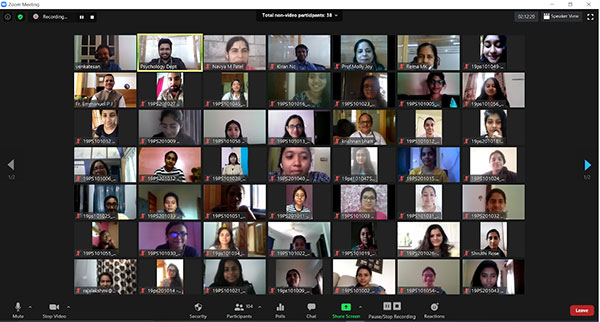
Webinar- Rorschach Inkblot Test
A two day Webinar on the ‘Rorschach Inkblot Test’, was organized by the Department of Psychology on 1st and 2nd of July, 2020. A total of 85 students, professors, research scholars, and mental health professionals from various organizations across the country actively participated in the program.
The resource persons for the Webinar were Dr. Rema M.K. Assistant Professor, Kristu Jayanti College, and Mr. Vigraanth Bapu K.G Assistant Professor, Kristu Jayanti College.
The program began with an introduction to the Rorschach Inkblot Test and its administration by Mr. Vigraanth Bapu K.G. who gave a detailed explanation of personality assessments in the light of projective techniques and further elaborated on the history and various techniques used in the Rorschach Inkblot Test. The session was further continued by Dr. Rema M.K., in which she emphasized on the use of the Exner’s method of administering and interpreting the test. The second day of the webinar was continued by Dr. Rema MK. in which she elucidated on the coding and analysis of the Rorschach Inkblot Test. The two days Webinar was cherished for its interactive nature. The session laid the seed for learning the administration of the Rorschach Inkblot test in the hearts of the learners. It was indeed an enriching and enlightening experience for the participants.
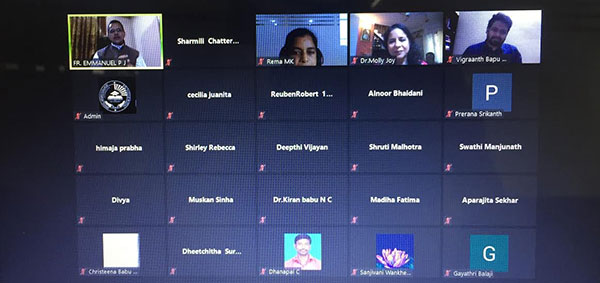
Insight 2020- 6th National Conference on ‘Transforming lives through Inclusiveness’
The Department of Psychology organized the 6th National Conference - Insight 2020 on 9th and 10th January 2020, at Mini Audi III, Kristu Jayanti College, from 9:00am to 5:00pm. The conference was inaugurated by Dr. Anitha Kurup, Dean School of Social Sciences, National Institute of Advanced Studies, Bangalore.
The speaker shared her view on inclusiveness in Education. She stated that there are 27 universities, 695 colleges in 1948, having objectives of Expansion and Equality whereas today India has got 993 universities, 39931 colleges and the objective is Quality and Excellence. The challenge for universities today is whether to create knowledge or enhance skills for employability. The speaker suggested that pedagogy of higher education should have inter-culturalism and interdisciplinary aspects incorporated in it. During the 2nd Keynote session, Dr. Rajani Ramachandran, Assistant Professor, Calicut University spoke on Neurodiversity and Inclusive community. She focused on bringing children with special needs into mainstream education. According to 2011 consensus, 2.68 crore children out of 121 crore are disabled. The speaker also spoke on how the legal system has benefitted children, enabling children with disability to attend school and have meaningful and employable education.
She stated that the attitude of parents and teacher of autistic children and policy makers are negative and that the need for integrating Neuroplasticity and Neurodiversity, by focusing on instructional needs of each and every division and include students with cognitive disabilities into mainstream which will encourage inclusiveness to a great extent.
The afternoon session commenced at 1.45pm and there was a special programme of music, dance and skit by Christ special school children followed by mime and dance by the under graduate and post graduate students of Psychology on the theme -Inclusiveness of differently abled, to sensitize and promote awareness on being inclusive in all walks of life. Five short films on different aspects of differently abled in school, college and work place setting were screened for the sensitization of issues and discriminations prevalent in the society.
Day 2 Started with commencement of scientific session by 10am, Chairpersons of the session were Dr. Guneeth Kaur, HoD, Dept. of Psychology, Jain University and Dr. Molly Joy, HoD, Dept. of Psychology, Kristu Jayanti College. 12 Papers were shortlisted for presentation and 2 best papers were selected.
The Afternoon session commenced by 1.45 pm with panel Discussion. The moderator for the session was Prof. Dr. Ashok H.S, former Chair Person, Dept of Psychology, Bangalore University. There were four panelists who addressed different aspects of inclusiveness. Prof. Dr. S. Venkatesan HOD, Dept of psychology, All India Institute of Speech and Hearing, Mysore addressed on inclusiveness in policy making. Ms. Mahiraa Jaan, Dance Artist- Miracle on wheels, spoke on the importance of expression which has immense physiological, psychological, emotional benefits apart from various other implications. She said that practicing inclusiveness in including training and teaching art forms will bring in social change and benefits for differently abled. The next panelist Ms. Sophie Bint Dawud, TEFL Instructor, spoke on inclusiveness in gender equity, how society is biased in terms of skills and behavior, to achieve one’s need to feel included. Mr. Ritesh Rajani, HR Diversity Engagement partner, IBM Asia Pacific, spoke on Inclusiveness in workplace. He stated the importance of work place inclusion in HR, corporate, strategy both in policy and practice, creating an atmosphere and awareness on principle of inclusion and ensuring inclusion in all forms.
The valedictory ceremony commenced by 4.15pm. The Chief Guest for the valedictory session was Dr. B.S. Ponmudiraj, Deputy Advisor, Academic NAAC, UGC and MHRD, Government of India. He was welcomed by Rev. Fr. Josekutty PD, Principal, Kristu Jayanti College. The chief Guest in his valedictory address enlightened about transforming life with determination and that the change should come from within an individual. He also emphasized on values of inclusiveness.
The department magazine ‘Pravaha” was released during the valedictory ceremony by the chief guest. Also, the Best Paper was awarded by the chief guest to the delegates.
The conference was made successful by 200 internal participants and 27 delegates from various colleges across the country. The conference was very insightful and the learning opportunities enabled each individual to embrace inclusiveness in different walks of life, both personal and professional. The feedbacks received also suggested that the quality of the topics discussed and addressed, and the presence of the distinguished guests made the conference a grand success.
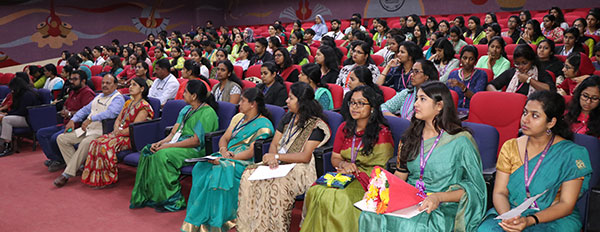
Proprium Series - Seminar
Title: Trends in Psychology
Date: 14th August 2019
Number of beneficiaries: Final year B.A., 1st & 2nd M.Sc Psychology and 1st & 2nd year M.Sc Counselling Psychology students.
Resource Person details: Prof. Dr. Basavanna Mallappa Former Professor, Sri Venkateswara University, Tirupati (AP)
Objective: The main objective of the program was to make the students aware of the career opportunities and emerging trends in the field of Psychology.
The Post Graduate and final year BA (JPEng) students of the Psychology Department of Kristu Jayanti College attended a workshop on ‘Trends in Psychology’ on 14th August, 2019. The resource person, Prof. Dr. Basavanna Mallappa, is a former professor of S.V University, Tirupathi and also an epitome of knowledge in the field of Psychology. He enlightened the students of Psychology with his presence and knowledge on 14th August, 2019. His talk mainly revolved around recent trends in the subject. He also spoke about his books based on his years of experience in the field. He started his talk describing the uniqueness of Psychology and how it is different from other fields. He gave an objective view on how this subject impacts all possible situations in our society. He then compared this subject with Philosophy and Mythology and spoke how these are connected to mental health. He mentioned anecdotes from Roman and Greek Mythology.He gave his unique perspective to Psychology and women; and blended these two topics in one. He spoke about western psychologists and explained them based on the impact they have on this subject. He also gave few personal insights which gave a personal touch to his talk.
It was an enlightening and enriching experience for the students as they got to know the subject and its possibilities from a different perspective.
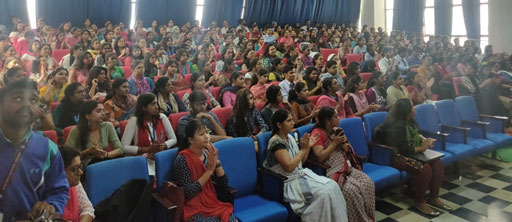
4th National conference Insight
Proceedings of Day 1
The 4th National conference Insight with the theme “Modern Tools and Technology in Research: Trans-disciplinary Perspectives” began with 88 delegates from different parts of India. The inaugural session commenced at 9:30 am with the invocation song sung by the department choir and welcome address by Dr. Krishnan Bhatt followed by lighting of the lamp. In the conference prelude Dr. Molly Joy elaborated on the conference theme and the significance of having an inclusive dialogue with experts in research and applied psychology. She also spoke on the relevance of the transdisciplinary approach and use of modern research tools. She also mentioned about the publication of papers in UGC approved International Journal of Psychological Science (IJPS), with a high impact factor of 6.696. Out of the 60 Papers received 21 were selected for the same.
In his presidential address Rev. Fr. Josekutty P.D., Principal Kristu Jayanti College spoke on the significance of a transdisciplinary approach and the need for efficient use of modern tools and techniques in research. He also emphasized on the importance of sharing this knowledge and its application for the overall wellbeing and growth of the society.
The Chief Guest for the session Mr. Girish Kumar was introduced by Ms. Kavita .R. In his inaugural address Mr. Girish Kumar spoke about the substantial impact of research on the society. And the relevance of modern tools and techniques that are helpful in the accuracy of data analysis. He also accentuated on the need to master the various tools and techniques in research. The inaugural session ended with the vote of thanks by Ms. Sanjna Sajan, Conference Student coordinator.
The first Panel Discussion was moderated by Dr. Ashok H.S. which began at 10:45am with a discussion on Positive psychology led by Mr. Sreesha, Pegasus Institute, Bangalore who emphasized on the application and significance of appreciative inquiry, Appreciative Experiential learning and participative action research.
The second discussion on educational psychology was led by Dr. Srikanta Swamy who pointed out the application of technology for efficient teaching learning practices, and how information technology, instructional technology, smart board, flip over classroom need to be used to empower the learners.
Dr. Surendra Veeriah spoke on the two psychological dimensions in psycho oncology: psychosocial and psychobiological. He also emphasized on the need to focus on quality of life and further research in the field.
The discussion on cognitive neuroscience was led by Dr. Jamuna Rajeshwaran who gave emphasis on the relevance of neurofeedback in the treatment and rehabilitation of patients with different levels of brain damage and the need for further research and application of modern techniques in this process.
Four scientific sessions were conducted in different venues on day one and two in which 32 papers were presented on positive psychology, educational psychology, clinical psychology and industrial psychology. The best paper was selected and will be announced during the valedictory ceremony. Day one ended with a cultural program.
Proceedings of Day 2
The second panel session was moderated by Mr. N.P. Singh who began the session with an emphasis that psychology is the future for national security of our country. Mr. Bhaskar Roy gave an introduction to Nano technology and discussed the difference between micro, macro and Nano scales and their size comparison. He also elaborated on the application of nanotechnology in various areas of day to day life. In her discussion on forensic psychology Dr. Malini Subramanyam accentuated the role of various techniques like brain mapping and narco-analysis to unearth the exact details of various crimes. She elaborated on how the brain waves reveal the participation of the convict in the crime.
Dr. Vijay Mishra in his discussion on quantum physics spoke on the various developments in the field of quantum physics and how human beings perceive what they see. He also mentioned about quantum Mysticism, the role of Nano science engineering and cell culture. Mr. Sailesh R. elaborated on artificial intelligence and the difference between artificial intelligence and human intelligence. Mr. N.P Singh concluded the session by the role of psychologists in managing combat stress. The positive and negative aspects of combat stress and the various stressors in the life of a combat.
The valedictory ceremony was attended by Shri N. P. Singh, Chief Guest accompanied by Rev. Fr. Augustine George, Rev. Fr. Emmanuel P. J., Dean Dr. Gopakumar A.V., HOD Dr. Molly Joy, Faculty coordinator Shri Vigraanth Bapu K. G., and student coordinator Ms. Shruti Chandran. The guests praised the success of the conference and also emphasized on the need for usage of tools and techniques in research. The vote of thanks was proposed by Shri. Vigraanth Bapu K. G.

INSIGHT- 2017
Department of Psychology organized Two day national conference on Deconstructing Professional Psychology: Big Fish in Small Pond on February 2017. Chief Guest, Shri Prahalad Rao, Director, Thomas Assessments Bangalore spoke about the applied psychology spectrum in all the fields and in particular about organizational applications and behavioral assessments which have a huge role in all types of organizations. He emphasized the growing influence of Psychology across different areas and stated that the importance of psychology shall keep growing in the days to come.
Session I: Psychology of Self , Dr Geetha Appachu, stressed on the older concepts of self from the vedic time to the present day understanding of self ,she quickly highlighted on the significance of self and also explained few techniques through which we can know and accept self
Session II: Indian Psychology, Dr. George Mathew, spoke on Indian psychology and different cultural approaches and applications. He highlighted the philosophical, literary and cultural aspects of Indian thought pertaining to psychology and the role Indian Psychology played in shaping thought and behavior in society.
Session III: Research in Psychology, Dr. Arun Tipandjan discussed the importance of research and the role of research in many applied areas of Psychology. He stressed on the importance of research and the scope offered by different approaches to research. He particularly stated that cross cultural researches are very rare or almost nil in India and the opportunities in such study. He also mentioned photo voice techniques, world café and qualitative data analysis.
Session IV: Counselling and consultation: The Road less Travlled, Fr. Simon dwelt on different approaches to counseling and the application of counselling in varied areas and the importance of skills in a counselor- in particular the ability to listen and the ethics of caring.
Session V: Psychpathology and Disability Rehabilation, Shri. Jini Gopinath compared Western context vis-a-vis the Indian context in relation to rehabilitation and Psychopathology. He stated that the process is a team work and involves institutional and long term commitment. He stressed that rehabilitation should address emotional coping, mental and psychological adaptation in a positive way to disability.
Session VI: Psychopathology and Disability Rehabilitation, Dr. Krishnaveni, spoke in detail of different application areas like PMS, compensation management, learning and development, employee engagement, organizational structuring and other miscellaneous areas of human resource development where psychology plays a major role and has vast scope.
The valedictory was chaired by Dr. George Mathew.
World mental Health Day
One day seminar was organized to observe the World mental Health Day; the topic selected was ageing as one of the factors which play a major role in the mental health of ageing population. Dr. N.L.Suman, from NIMHANS spoke on various tactics to have positive attitude towards ageing and also explained the various mechanisms to cope with the changes due to ageing.

